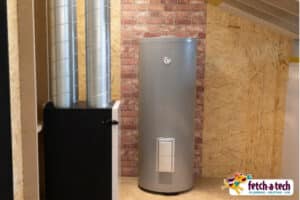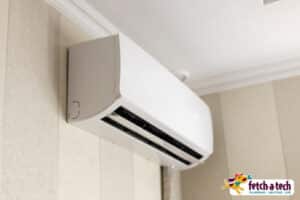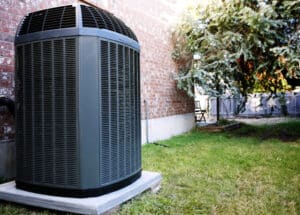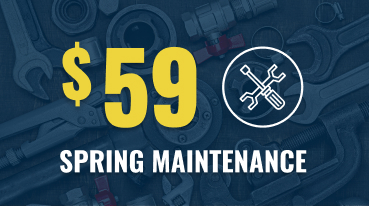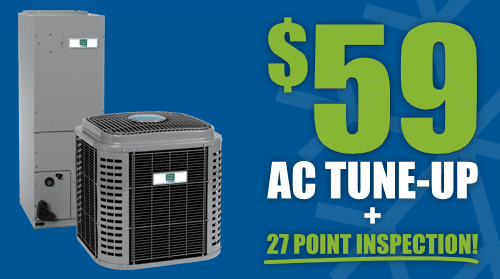In the heat of summer, a functional air conditioning system is a lifesaver. But if you want to make sure your air conditioner is ready for the busy season, regular maintenance is essential. An annual AC tune-up can not only extend the lifespan of your unit, but it can save you money on your energy bills.
Here’s the ultimate AC Tune-up checklist for energy efficiency from the experts at Fetch-A-Tech.
Why Is AC Maintenance Important?
When your system is well maintained, it operates more smoothly, requires less energy to cool the space, and keeps you more comfortable. In turn, you will have lower energy bills and a reduced carbon footprint.
Seasonal AC Maintenance Schedule
It’s best to follow a seasonal air conditioning maintenance schedule. Here’s what you should focus on during each season:
Spring
Spring is a good time to make sure your air conditioning is running as it should and prepare for the summer heat. Here are some vital maintenance tasks:
- Clean or replace the air filter:A dirty air filter can restrict air flow, making your air conditioner work harder to cool your home. You should clean or replace your air filter every one to three months, depending on its use.
- Check thermostat settings:Ensure your thermostat is set to your desired temperature and consider upgrading to a programmable thermostat for better control and energy savings. If you have issues with the thermostat, now is the time to get them repaired.
Summer
Summer is your air conditioner’s peak season. While you’ve ideally gotten any problems fixed before summer started, you should still keep up with maintenance during the season to keep it running well.
- Inspect and clean coils:The evaporator and condenser coils can get dirty throughout the season. Clean them to keep the system running smoothly.
- Clean the condensate drain:A clogged condensate drain can lead to water damage. Flush the drain with vinegar to prevent blockages.
Fall
After the long summer, you can give your air conditioner some care to prepare for the off season.
- Inspect the outdoor unit:Clear debris and foliage from around the outdoor condenser unit to ensure proper air flow.
- Check for leaks in ductwork:Leaking ducts can cause energy waste. Seal any leaks with duct tape and call a professional HVAC technician for repairs.
Winter
- Cover the outdoor unit:Protect the condenser unit from winter weather by covering it, but make sure to leave proper ventilation to prevent moisture buildup.
- Schedule an inspection:A thorough inspection from a qualified HVAC professional can identify potential issues with your system before they become major problems.
Your Ultimate AC Tune-Up Checklist
Inspect and Clean Air Filters
Cleaning or changing the air filters is one of the simplest but most impactful tasks you can do for your air conditioning. Check the condition of the air filter and clean or replace it according to the manufacturer’s recommendations. If air quality is a concern, you can upgrade to a high-efficiency filter for better air quality and improved system performance.
Examine Thermostat Settings
Test the thermostat with the system on to see if it responds. Verify that the thermostat is calibrated properly. This is a good time to consider upgrading to a programmable thermostat to get extra energy savings and personalized temperature control.
Check and Tighten Electrical Connections
Inspect all the electrical connections for signs of wear or damage. Tighten any loose connections to prevent electrical issues and ensure optimal performance, if you’re comfortable doing so. Avoid tackling any major electrical repairs on your own.
Lubricate Moving Parts
Lubricate the moving parts of your air conditioner to reduce friction during operation and ensure these parts can move smoothly, leading to better efficiency. Typically, this includes the motors, bearings, and other components that move and are prone to wear and tear with regular use. Follow the manufacturer’s instructions for lubricating your air conditioning components.
Inspect and Clean Evaporator and Condenser Coils

The evaporator and condenser coils are important for the heat exchange that takes place in the system. These coils build up dirt and debris over time, which affects their ability to absorb and release heat the way they should. Inspect the coils and clean them as needed. Make sure to remove any debris or vegetation that’s crowding the unit.
Clean Condensate Drain
The condensate drain collects moisture from the cooling process to prevent moisture buildup in the system. This drain can become clogged with mold, debris, or algae, so inspect it to make sure it’s flowing freely. You can also rinse the condensate drain with vinegar.
Inspect Refrigerant Levels
If your refrigerant levels are low, it can impact your system’s cooling performance and lead to higher energy consumption. Inspect the refrigerant levels and check the manufacturer’s guidelines to see the recommended levels. Keep in mind that refrigerant is not something that you should DIY. Only professional HVAC technicians should handle refrigerant.
Inspect Ductwork

Leaking or dirty ducts can cause a loss of cool air and poor efficiency in your air conditioner. Inspect your ductwork to see if there are any cracks or leaks. You can seal gaps using duct tape, or simply call a professional technician to repair and clean your ducts properly.
Test System Controls
Test your air conditioner’s starting cycle, operating, and shut-off sequence. Make sure it turns on and off smoothly and responds to changes in the thermostat settings accurately. If anything is amiss, call a professional HVAC technician for a repair.
Inspect and Clean Blower Components
The blower components are crucial to operation and can accumulate dirt and debris over time. Clean the blower assembly, pulleys, and belts for optimal air flow and energy efficiency. If you’re not comfortable with this task, hire a professional HVAC technician.
Check Insulation
Look at the insulation on the refrigerant lines to make sure it’s in good condition. You should also check your home’s insulation around windows and doors to ensure that you have a tight seal and you’re not losing cool air through the gaps. Proper insulation and sealing are a big part of energy efficiency and a cool, comfortable home.
Inspect Outdoor Unit
Make sure to inspect your outdoor HVAC unit. Check the panels that enclose the electrical connections to ensure they’re in place. Otherwise, you could end up with problems in your system or safety hazards. If you have a missing panel, contact a licensed HVAC technician to assess it.

Benefits of Regular AC Tune-Ups
There are several benefits to an AC tune-up, including:
Improved Performance
The main reason that air conditioning tune-ups are recommended is because they improve your unit’s performance. With regular use, air conditioners accumulate dirt, dust, and debris that can impact efficiency and lead to breakdowns.
Better Lifespan
Your air conditioner is a major investment in your home, so you want it to last as long as possible. Regular tune-ups contribute to the longevity of your air conditioning unit by preventing wear and tear, lubricating moving parts, and tackling minor repairs before they can cause failures.
Energy Efficiency
A well-maintained system is more efficient and requires less energy to cool your home effectively. If you neglect your air conditioning, it will need to work harder, leading to more energy used – without necessarily improving your home’s comfort – and more expensive energy bills.
Fewer Repairs
Major repairs often come at the least convenient times. For air conditioning, that’s usually in the middle of a heat wave. Regular tune-ups identify small problems before they can lead to a necessary repair, often before the season starts, so you can get them fixed early.
More Comfort
Your air conditioner is important for your home’s comfort during the summer. When your system is struggling to work properly, it may not provide even cooling. Worse yet, you could have an air conditioner that’s blowing warm air. Tune-ups ensure that your system has consistent cool air flow.
Better Indoor Air Quality
Your air conditioner is important for maintaining good indoor air quality. If you neglect your system, it can accumulate dirt, allergens, and other pollutants that can irritate your respiratory system, but tune-ups keep your system clean and clear to promote healthier indoor air. If you have family members with respiratory illnesses, this is even more important.

Improve Your Air Conditioner’s Energy Efficiency with Tune-Ups
This AC tune-up checklist for energy efficiency offers all you need to know to keep your system running in optimal condition in the summer season. Regular maintenance is important for energy efficiency, but it also offers benefits like better comfort, improved indoor air quality, and long-term cost savings.
Ready to enjoy a cool and comfortable indoor environment while minimizing energy costs? Contact us at Fetch-A-Tech to schedule your appointment!


